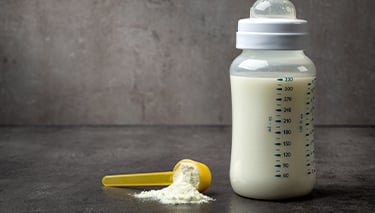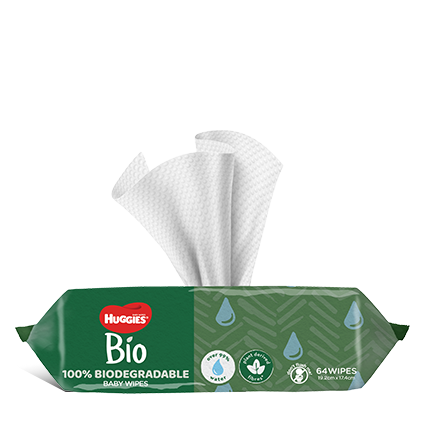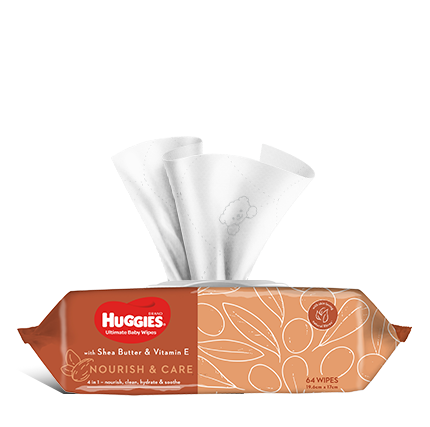You will find that almost any parent or caregiver who has trawled the infant formula aisle of a supermarket, trying to compare one brand with another, will be familiar with that sense of being completely bamboozled by the jargon. Infant formulas are continually being improved in efforts to replicate breastmilk. The use of terminology on products is increasingly common and the terms are getting longer. The following is a brief summary of some of the more common technical terms used by manufacturers of infant formulas.
AR = anti-regurgitation
Selected formulas include a small amount of thickening agents from rice starch, carob bean flour or processed cornstarch in place of some of the lactose (milk sugar). Formula, with added thickening agents is thought to help bubs who tend to ‘posset’ or regurgitate often or in large volume after feeding. Always chat to a healthcare professional if your baby is having any difficulty with feeding and get good advice about the best road to take before trialing specialised formula.
LCPs – long-chain polyunsaturated fatty acids (PUFAs)
A number of formulas contain added long chain polyunsaturated fatty acids (PUFAs) such as docohexaenoic (more commonly known as DHA – the health-giving fatty acid found in fish) and arachidonic fatty acids. These fatty acids, along with their cousins alpha linolenic and linoleic acid, are found in breastmilk and are important for baby’s brain and eye development as well as being implicated in anti-inflammatory responses to allergens and the like. PUFAs accumulate in baby’s brain in the last trimester of pregnancy and in the first month of life, and it is thought that infants are less able to produce such PUFAs themselves. Studies have shown that formula-fed babies can have less LCP’s in their brains and blood than breastfed babies. However, a number of studies have shown that infants fed on formula with added PUFAs have better visual function as toddlers than those fed on formulas without PUFAs. Keep in mind that these are just handful of studies and you know how trends can change, and of course eyesight is a function of a great many factors. There is research that appears to show that infants consuming formula with LCPs have softer bowel movements than those fed with ordinary formulas.
What does the term ‘Gold’ mean?
You may have noticed the use of the term ‘gold’ on some infant formula tins; this refers to the inclusion of omega 3 oils (DHA and EPA, found in fish such as salmon), also shown as LCPUFAs (long chain polyunsaturated fatty acids) or LCPs. LCPs are important in motor, eye and brain development and given a baby’s rapid rate of growth they perform an important function.
Nucleotides
Sounds like a very powerful word! Nucleotides are small parts of our genetic material; they are involved in energy production and the use of protein, fat and carbohydrates by the body. Nucleotides are found in most living cells as they are the structural units of DNA and RNA (genetic material). The nucleotides in our food are complexes that get broken down during digestion to compounds such as nucleosides. Nucleosides are what our intestinal cells prefer and can absorb. While our bodies can make nucleotides, it not only takes a lot of energy to do this, but during times such as rapid growth production may not match requirements. Additionally, it is thought that infants aren’t able to make nucleotides as efficiently.
The benefit of nucleotides in formula is thought to include:
- Assisting rapidly dividing cells in the intestinal tract
- Immune support
- Improved iron uptake
- Support for healthy intestinal bacteria
- Softer stools
- Improved cholesterol levels
Probiotics
The intestinal canal – which has an array of bacteria – forms a vital part of our immune functioning: probiotics are bacteria that grow in our gut and strongly influence bowel health. Breastfed babies tend to have healthy bowel flora, mainly bifidobacteria (over 90 per cent) that protects against infections and keeps baby’s motions soft. Interestingly, infants born via caesarian can have very lower levels of healthy intestinal bacteria. So if you had a c-section and are formula feeding, opting for one with probiotics may be beneficial. Formula-fed babies still have bacteria in their bowel, but not as much bifidobacteria. There is also some research suggesting that bubs on formula that contains Bifidus B have less febrile temperatures and experience less diarrhoea.
Formula with probiotics appears to change baby’s bowel flora to be closer to that of a breastfed baby. Studies show that probiotic formulas may soften bowel motions, assist in preventing nappy rash and offer some protection against gastroenteritis. Lastly, probiotics may assist in preventing allergies, in particular infantile eczema.
Beta-carotene
Beta-carotene is found mainly in dark green and yellow fruit and vegetables (for example carrots) and in breastmilk (being very high in the early milk during the first week after birth). Our body changes much of the beta-carotene we eat into vitamin A, to be used for the healthy growth of body cells. The beta-carotene that remains unchanged is used directly as an antioxidant, which helps prevent cell damage and, possibly, cancer in older people. While vitamin A levels are sufficient in all formulas, many do not have beta-carotene. It is interesting though, that evidence to date does not support any health benefit for babies having beta-carotene as well as vitamin A in their formula.
Last Published* May, 2024
*Please note that the published date may not be the same as the date that the content was created and that information above may have changed since.




















